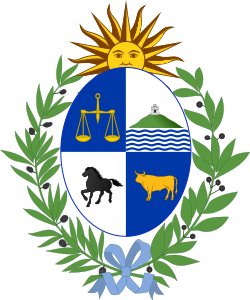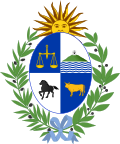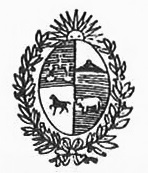Coat of arms of Uruguay
| Coat of arms of Uruguay | |
|---|---|
 | |
| Versions | |
 1829-1906 | |
| Armiger | Oriental Republic of Uruguay |
| Adopted | 19 March 1829 |
| Crest | A Sun of May or |
| Shield | Quarterly the 1st: Azure, a Scales of Justice or; the 2nd: Argent in base Barry wavy Argent and Azure, a representation of Cerro de Montevideo (Montevideo Hill) with its fortress on the summit proper; the 3rd: Argent, a horse Sable; the 4th: Azure, an ox Or. |
| Other elements | The oval is surrounded by a laurel branch on the left and an olive one on the right, joined at the bottom by a blue ribbon or a tie through the leaves/branches |
| This article is part of a series on the |
| Culture of Uruguay |
|---|
 |
|
Uruguay Portal |
The coat of arms of Uruguay or Uruguayan shield (Spanish: Escudo de Armas del Estado) was first adopted by law on March 19, 1829, and later on had some minor modification in 1906 and 1908. It was supposedly designed by Juan Manuel Besnes Irigoyen (1788–1865), based on the coat of arms of Argentina.
Description and meaning
It consists of an oval shield, which is divided into four equal sections and crowned by a rising golden sun, the “Sun of May”, symbolizing the rising of the Uruguayan nation and the May Revolution. The oval is surrounded by a laurel branch on the left and an olive one on the right, symbolising triumph and peace respectively, tied at the bottom by a light blue ribbon, the former uruguayan cockade.
In the upper left quarter there is a golden scale on a blue background, symbol of equality and justice.
The upper right quarter contains the Cerro de Montevideo (Montevideo Hill) with its fortress on top on a silver background, as a symbol of strength.
In the lower left, also on a silver background, there is a galloping black horse, symbolizing liberty.
The lower right quarter holds a golden ox on blue background, as a symbol of abundance and plenty.
Modifications
From 1829 the coat of arms was ornamented with multiple Uruguayan Flags on each side, weapons, and various elements of commerce, in 1906 the design was simplified by law eliminating all ornaments and standardizing the design.
Historical coats of arms
-
Coat of Arms Oriental Province (1815-1817)
-
Coat of Arms Cisplatina Province (1815-1828)
-
Seal of the Oriental Province (1817)
-
Oriental State of Uruguay (1829-1906)

























